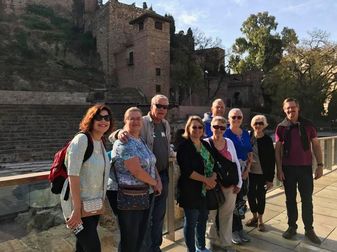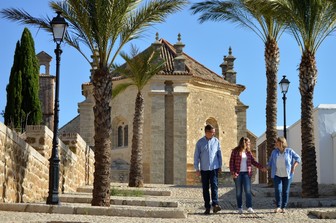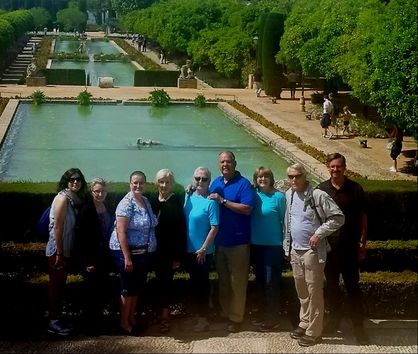 The only source of knowledge is experience. ~Albert Einstien In April, as most of you were enjoying your Easter Sunday complete with new church outfit and brunch and flowers and egg hunts, a group of eight Texans boarded planes and crossed the ocean to come and see and experience and learn the answer to the question, “Why Spain?” Why is Spain a place for mission work? What is the state of the church and the culture and the people? Eight inquisitive minds spent a week here to dig deeper in to the history of Spain, specifically the religious history of Spain. We visited sites from many different time periods and religious backgrounds. This group may have been little, but they were mighty in their pursuit of knowledge! We visited synagogues and mosques and cathedrals. We learned about Romans and Visigoths and Moors and the Spanish Catholic Kings. Sadly, we learned much about war. “What we learned about Spain’s religious history was most surprising. We were expecting a country with a large practicing Catholic population. But what we found were empty churches, and many smaller towns with no active church – either Catholic or protestant,” recounts Marilyn. “I was so saddened and burdened by the lasting harm that has been done by religion in Europe,” says Donna. She was referring to the history and it’s lasting effect on the culture here. Many people today do not wish to have anything to do with religion or with the church because of the long-standing history here. Several local friends have had this discussion with us. Locals openly say, “Why would I want to have anything to do with the church? Religion leads to fighting and war. It always has. From the beginning of Spanish history, we’ve seen nothing but war based on religion. And we’ve watched the church play politics and cause extortion and oppression. Pfff! I want nothing to do with that!” Sadly, this is the truth for many here. Remember the Spanish Inquisition? Remember the years of forced conversions and torture in the name of religion? And most recently, the Spanish Civil War and a dictatorship. Religion has not been a bed of roses in Spain. “What impacted us most was the dinner and conversations we had with your local church leadership team. Bernardo’s testimony of what happened to him as a young man in the Catholic church was startling. What the church did to him… if you did not worship in the exact way the church leaders demanded you to, or if you questioned why… to hear that he was physically removed from the church during an active mass in front of everyone, that he was slapped in the face at the altar and physically dragged and kicked out the door. Then to hear the story of the other woman, Maricarmen… how she read the Bible in her home and the priest admonished her because common people are not allowed to read the Scriptures. How the priests took Bibles away from people and piled them up and burned them in the churchyard. This did not happen 1000 years ago – it happened in the 1970s! I was amazed to sit and hear these stories from people my age. I did not realize that Spain did not have religious freedom until 1978. Wow!” Donna adds, “Seeing all the communities where there is no presence of a healthy church… it’s staggering. The numbers of people in the tens of thousands just in the small radius of travel that we did. So many people who don’t know Jesus! I’m reminded of the verse that the fields are ripe for the harvest, but the workers are few. Who will go?” It is true. 26% of Spaniards consider themselves atheists. Only 7% of Europeans say faith is an important value for them, while only 3% of Spaniards say faith is an important value. From the 1930s to the 1970s, Spain was a dictatorship with mandatory Catholicism as its religious base. By the fall of the dictatorship, people felt extreme oppression by the church and began the exodus. Now, while amazing cathedrals are on every corner, they are mostly empty. And protestant churches are few and far between – many protestant churches are small congregations (less than 100) and are mostly found in the urban hubs. Small towns dot the Spanish countryside, each within a 10-20 mile radius of the next, but you can drive for hours and not find a congregation of believers. Patricia shared her thoughts, “I grew up saying a little hand rhyme: ‘Here is the church, here is the steeple; Open the door and see all the people.’ But by putting the hands together a different way, it all changes: ‘Here is the church, here is the steeple; Open the door, but where are the people?’ “Empty buildings. That’s what I saw. Empty cathedrals and churches. The reality of what has happened in Spain because people were forced – by politics, by power, and by greed. If you dictate to people what they must think, if you don’t allow for any discussion or respect for differences or thought, if you silence people, you will just drive them away from the church. And in just a few years, no one is interested in being involved in the church because it caused them so much pain and loss of freedom, loss of speech, just loss.” So, what was the big take away from the trip for these eight team members? “All week I was learning about this history and the effects on the church and faith here, and I was wondering how a missionary can spread the good news in a country where religion has been so damaging and misrepresented? Billy and Laurie and their church leadership team desire to witness the Truth to their community. They said that living by Jesus’ example, by loving your neighbor, good conversations, gaining respect, small steps – Jesus will open the hearts of people,” commented Ernie. Another team member replied, “It was amazing for me to learn about the culture and history and religious influences in Spain. It gave me a greater appreciation for the work in Antequera and how to demonstrate what life looks like as Jesus followers. In fact, that’s a new term I’m using now. I realize how the word Christian has been used to damage others and it is now having a negative effect on people. I am personally working more diligently to be a follower of Jesus. I came away with a deeper appreciation for the mission work in Spain and the impact the Drum family is making on the church and the community there.” Amanda added, “When Paul went to the Gentiles, he was ministering to a people whose culture was different than his own. When he went to others, he approached them via their own culture. In my psychology career, I know how important culture is in order to relate to others. This trip has really solidified that understanding for me in terms of what cross-cultural workers do for The Kingdom. I think, as believers, we need to understand the uniqueness God has gifted each culture with. Our job isn’t to change their culture to be more like us or to fit our idea of what it means to be a Christian, but rather to help them see what it means to be a Christian within their culture, and use that uniqueness to His glory.” Please pray for healing; for God to heal generations of wounds caused in the name of religion. Pray for Jesus to find unique ways to come alongside people and love them well, to meet them where they are, and to warm their hearts with his love.
2 Comments
 We are THOSE parents. The parents who didn’t show up to the birthday party. The parents who left early. The parents who didn’t send money. You know the ones… One of the hardest things about doing what we do is that we are no longer living in a culture where we know all the rules. We don’t always understand the unwritten norms, the subtle innuendos, or how to do things the ‘right way’. Because we’re the immigrant parents. We’re the parents who didn’t grow up here. We’re the people who are sitting in the parent meeting with a classroom full of other parents and we’re trying desperately to keep up with the vocabulary. Except for the two parents who are a doctor and a dentist, we probably have more years of higher education and more degrees than anyone else in the room – yet we are definitely struggling to keep up and we leave every meeting with more questions than when we walked in. My first realization of this was several years ago, back in Peru, when my daughter was beginning her foray in to the education system. Just registering her for school was a challenge. I suddenly realized that there was a huge difference between every day conversational Spanish and professional level Spanish vocabulary. The next big hurdle was the school supply list and the shopping that ensued. Guess what, folks – there are MANY different words for specific types of papers and pencils and notebooks, none of which were taught to us in language school! So, there I was, THAT parent… the one who is standing in the school supply aisle looking confused and bewildered and asking the five year old to help translate the list. The one that finally, in a fit of desperation, after an hour of confusion, just hands the entire list to the sales person and says “Help me, please.” Yep, that was me. Need I remind you that I was a school teacher for 15 years?! A Master Teacher, at that! I was Team Leader. I was the Science Department Head. I was a trainer for student teachers and was a mentor to new ones as they began their careers. Yet, there I was, in tears in the school supply aisle, begging a five year old for help and surrendering my list and my cash to a sales girl. Y’all… being the immigrant parent IS NOT EASY! It’s a huge blow to your dignity and identity. It’s constantly being the parent who doesn’t get it. It’s constantly praying that you can ask an intelligent question without embarrassing your kid or yourself, all the while realizing that you are a highly educated person back in your home culture. But here, in your new culture, you’re THAT parent… the one who doesn’t ever understand and makes a gazillion mistakes. The one who’s child is having to translate the permission slip before you sign it, because the vocabulary is WAY above your pay grade. I’m thinking about this today because I’m having yet another one of those moments. It’s probably the umpteenth one in the last few weeks. Two weeks ago, I sat in another parent meeting and listened to the instructions for the 3-day field trip. Once again, I caught most of it, but still managed to miss enough that I was forced to ask questions to other parents around me. Thank Goodness, there is one parent in the class who is always super nice and willing to help me understand and fill in the gaps. Who makes sure that I heard the part about packing a sack lunch or sending an extra drink. And still, I miss things and I make mistakes.
This weekend, our daughter was invited to a surprise birthday party for a church friend. The birthday boy was turning 16. My only information for this party came through a text message invitation to my daughter. She was to bring 3 euros to help with a group gift. Be at the church at 7pm. That’s it. So, we thought, "teens, gathering at the church = good deal" and we planned to go out on a little date night while she was at the party. It wasn’t until we went to pick her up that we realized there were other parents there. Hmmm. Then, the next day at church, one of the parents was fussing because so few people came to support the party. Then another parent was complaining that people were so busy with their own agendas that they didn’t come – just sent their kid. Oops…I think that’s me. Once again. The unwritten rules bite me in the booty. THOSE parents (*eye roll, sigh*). Today, our daughter is receiving an award at school. The award ceremony is mid-day. She tells me that it is only for students and teachers, it’s an in-school assembly – no parents are invited. She swears that she doesn’t have to dress up or anything, her gym clothes are fine (it’s PE day). And yet, here I sit, praying that I’m not missing something; praying that we aren’t proven to be THOSE parents again today. Again, I’m feeling like I don’t know what I’m doing, like I’m failing at parenthood. Even though I have lived in the Spanish-speaking world for 10 years now, I still don’t always get it. No amount of cross-cultural teaching and language school can prepare you for the unwritten rules. Being an immigrant parent is hard. *UPDATE: We didn't miss anything - hallelujah! It really was an in-school awards assembly and there really were no parents there. All is well with the world... this time. |
Laurie DrumIn my USA life, I was a teacher in Texas for 15 years. I was also a professional photographer, a soccer mom, a horsewoman, and the neighborhood hospitality queen. I did "Joanna Gaines farmhouse style" before Chip and JoJo were even a thing - we restored an 1884 Victorian farmhouse in small town Texas and did shiplap walls until I thought I'd go crazy. I taught at NASA, scuba dived with astronauts in training, and studied animals at Sea World for educational purposes. I've tried just about everything, because I have an insatiable need to know if I can do it! Never underestimate a Texas girl in cowboy boots! In 2006, my husband Billy and I became cross-cultural workers (CCWs) with TMS Global. For five years, we served in three rural Quechua Wanca villages in the Andes of Peru. And when I say rural, I mean RURAL - like no potty! I spent my days in Peru learning to live a Quechua lifestyle in a rustic adobe house - cooking Peruvian foods, sewing with Quechua women, raising my chickens and goats and pigs, and planting my gardens. Now I live my life in small town Spain, serving other cross-cultural workers via teaching and training and care, and helping displaced people to navigate their new reality in Europe.
I'm passionate about fostering personal growth, growth in community, and growth in The Kingdom. Walking alongside others and helping them to use their unique design, their gifts and strengths and maximize their abilities to fulfill their God-given purpose - that's what makes my heart sing! Archives
March 2024
Categories |
What We Do About Us Media Contact Us
Copyright © 2013 ~ Billy Drum, 4717 Shoal Creek Dr., College Station, TX 77845 ~ 979.985.5238


 RSS Feed
RSS Feed

